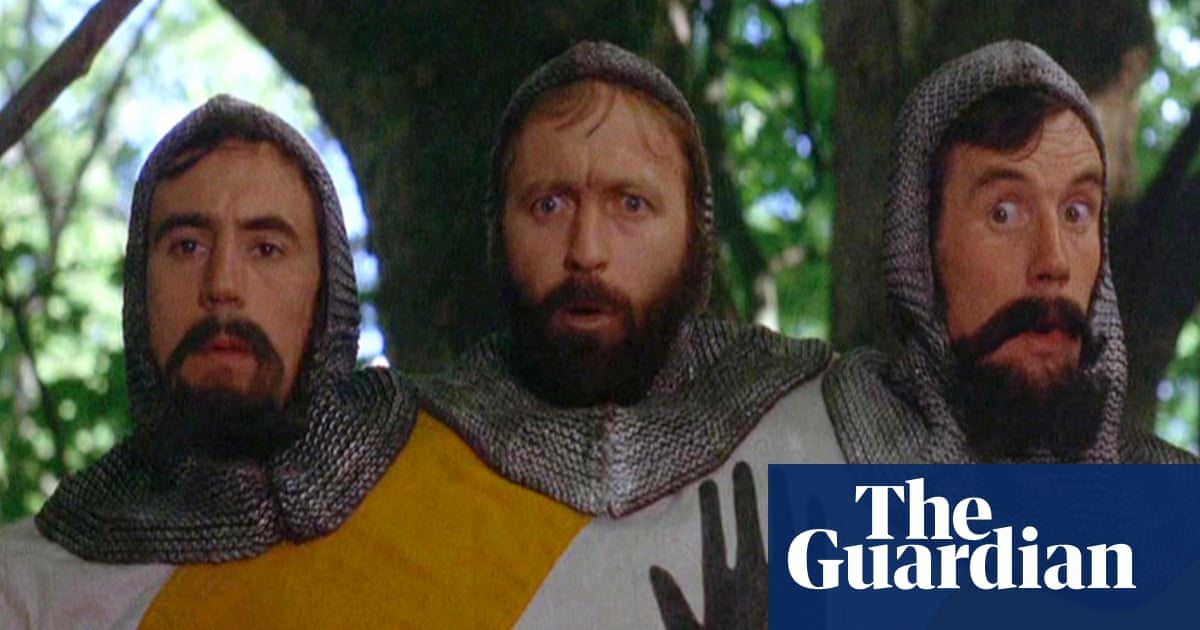It was with some surprise, as I gathered my recollections of Monty Python and the Holy Grail before its 50th anniversary this week, that I realised I had seen it in full only once, back when I and the film were both considerably younger. It felt like more. The first fully narrative feature by Britain’s best-loved TV sketch troupe is among the most fondly, frequently and recognisably referenced comedies in all cinema; the film’s best scenes are hard to separate from various everyday quotations or pub impressions thereof. Some comedy is made not so much to stand as individual art than to be absorbed into our collective comic language, and so it is with Monty Python, their best work a stew of endlessly imitable idioms and accents, to be relished with or without context.
In all truth, I remembered laughing at Monty Python and the Holy Grail more vividly than I remembered exactly what I was laughing at. For this I must blame my late father, whose laughter – loud and barking, often a beat ahead of lines already known and eagerly anticipated – I perhaps recall more vividly than my own. The film was one of a jumbled canon of comedies that, over the course of my childhood, he eagerly presented to my brother and I as apices of the form, with hit-and-miss results. (Paper Moon? Wholly shared joy. Those Magnificent Men in Their Flying Machines? He chuckled alone.) Monty Python and the Holy Grail was among the hits: some giggling fits are too giddy not to catch on.
Watching it a second time, on my own, I probably caught a good deal more of the jokes that were drowned out in my childhood, while others that I did remember – notably the famous running debate about the airspeed of a laden swallow – were more dementedly extended and involved than I might have guessed. The real surprise of this return visit, however, was the remarkable strike rate of the gags. I had expected a scattershot affair of lunatic highs and groan-worthy lows, as tends to be the pattern of sketch comedy, but the film’s antic wit is sustained better than its knowingly slipshod narrative and flashes of avant-garde style might suggest. Formally and structurally, the film may have been a chaotically experimental venture for much of the Python team – not least first-time feature directors Terry Gilliam and Terry Jones – but minute-to-minute jokes? No uncertainty there.
It could all have gone terribly wrong, of course. By 1973, when Monty Python and the Holy Grail was conceived, the team’s BBC show Monty Python’s Flying Circus was three series in and well on its way to a curious kind of status somewhere between cult and national treasure. It was popular enough to have already prompted a 1971 film spinoff that was little more than a greatest-hits compilation. Recreating numerous sketches from the show and stringing them together in an attempt to engage the elusive American market, And Now for Something Completely Different was something of a redundant curio – funny, certainly, but hardly cinematic. If the group were to have a big-screen career, they had to think beyond the short-form work they had already mastered. They had to tell a story. Sort of.
Arthurian legend had enjoyed a pop culture revival ripe for spoofing: the chintzy Broadway tunes of Lerner and Loewe’s Camelot were still ringing in audiences’ ears by the early 70s, while TH White’s popular tetralogy The Once and Future King had been given the Disney treatment in The Sword in the Stone a decade prior. Reimagining King Arthur – played with wonderfully queer bluster and defensiveness by the late Graham Chapman – and his Knights of the Round Table as an alternately brutal and ineffectual band of dolts, Gilliam and Jones’s film dismantled the macho romanticism of the Matter of Britain in one fell swoop, with a simple running gag that also handily got around the lack of animal-wrangling budget: no horses and just a limp-wristed, lolloping gait and two clopping coconut halves to underline their absence.
What is a knight without a steed? About as powerful as a king without a court, both of which apply to poor, hamstrung Arthur here, as he trudges vainly across England in search of who-knows-exactly-what, earning only the contempt of his sceptical, mud-stained subjects (“Just because some watery tart threw a sword at you,” one mutters) and mysteriously invading French adversaries along the way. It’s a healthily republican rejoinder to reams of awed Arthurian lore, sneaking some startlingly pithy class commentary in amid the loopy japing. “I didn’t vote for you,” says one unimpressed countryman to our horseless hero. “You don’t vote for kings,” Arthur counters, as if that answer raises no further questions.
But if sentimental historical myth-making comes in for a skewering here, so does the drab, earthy severity of the folk-horror wave in 1970s British cinema: extremities of violence and eroticism are here rendered ridiculous, even benign. Gilliam and Jones’s film may be a wilfully shaggy affair, delighting in its absurd logical leaps and blunt narrative dead ends, but it’s consistent in its undermining of rigid British storytelling traditions – not just with the gleefully vulgar anachronisms of the Carry On films, but with its own kind of gonzo political integrity.
Half a century on, the film is palpably a product of its era – visible in its own stylings and those of the contemporary works it responds to – but the Python sensibility remains so strangely, dizzily sui generis that it can’t really date all that much either. The team had more ambitious, polished films in their future: Life of Brian still carries an exhilaratingly subversive punch, while The Meaning of Life returned to the fragmented sketch format with a greater sense of perverse philosophical inquiry. Gilliam’s own flair for baroque lunacy, meanwhile, would reach artsier highs and grisly lows in his ensuing directorial career. But Monty Python and the Holy Grail remains a pure comic peak for him and the collective alike: a film made to be recited by heart, hilarious even as second-hand evocation, and still possessed of pleasures and surprises that generations of cultists haven’t yet spoiled.

 3 months ago
162
3 months ago
162

















































